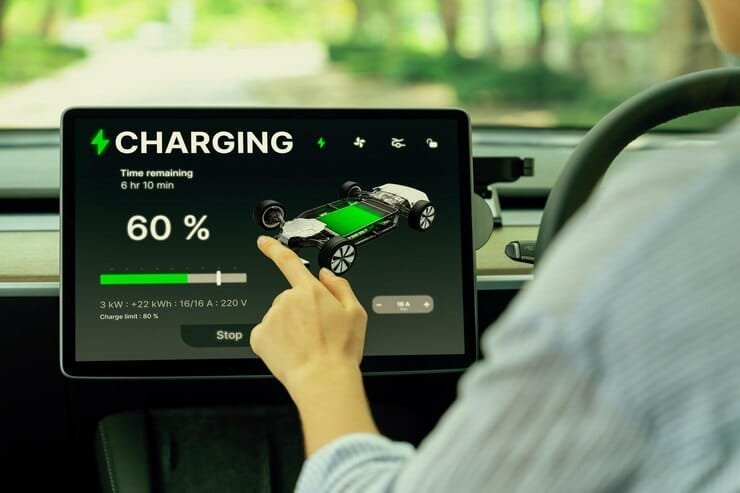Hey there, fellow auto-heads! Let’s talk connected cars – the future is now, and it’s seriously wild.
Remember those clunky car stereos from way back? Yeah, those are ancient history. Today, we’re talking about vehicles that are basically rolling smartphones, constantly connected to the internet, packed with sensors, and capable of doing things we only dreamed of a few years ago. We’re talking about cars that can park themselves, anticipate accidents, and even order your coffee before you even reach the drive-thru. Crazy, right?
But here’s the deal: This isn’t just about cool gadgets. The connected car revolution is shaking up the entire automotive industry – and I mean shaking it up. We’re not just talking about adding some features; we’re talking about a complete overhaul of how cars are designed, manufactured, sold, and even experienced.
Think about it: Software updates over-the-air, subscription services for features, data-driven insights impacting design and manufacturing… the entire game is changing, and fast. For automakers, it’s not just about building a great car anymore; it’s about building a great digital ecosystem.
This isn’t some distant future scenario either. We’re knee-deep in it right now. And for business leaders in the auto industry, the question is no longer if they need to adapt, but how fast they can adapt without getting left behind. This blog post is going to dive deep into the challenges and opportunities facing automakers in this brave new world of connected vehicles. So grab your coffee (or maybe your car’s built-in espresso machine!), and let’s get started!
Hey there, fellow car enthusiast and business strategist! Let’s dive into the wild world of connected cars – it’s a crazy exciting, rapidly changing landscape, and understanding the trends is key to winning the game.

Positive Trends: The Good Stuff!
- Data is King (and Queen!): Think of all the data a connected car generates – location, driving habits, maintenance needs… it’s a goldmine! Companies like Tesla are already leveraging this data for predictive maintenance, improving their autonomous driving systems, and even creating personalized driving experiences. This means huge opportunities for data analytics firms, insurance companies (think usage-based insurance!), and even entertainment providers.
- Autonomous Driving – The Future is Now (ish!): Self-driving tech is evolving FAST. While fully autonomous cars aren’t everywhere yet, features like adaptive cruise control and lane-keeping assist are becoming standard. This creates opportunities for tech companies like Waymo and Cruise, but also presents challenges for traditional automakers who need to rapidly adapt.
- The Rise of the Software-Defined Vehicle: Cars are becoming less about mechanical engineering and more about software. This means regular over-the-air updates, customizable features, and a longer car lifespan (because you can update it!). Companies like Volkswagen are investing heavily in this approach. This means software expertise becomes critical, opening doors for software developers and tech giants to play a bigger role.
Adverse Trends: The Bumps in the Road
- Cybersecurity Woes: Connecting cars to the internet makes them vulnerable to hacking. Imagine a malicious actor taking control of your brakes… scary stuff! This necessitates robust cybersecurity measures. Companies need to invest heavily in this area, or risk losing customer trust and facing massive legal consequences. Look at the recent incidents with various connected car systems – it’s a constant battle.
- Data Privacy Concerns: All that juicy data is also a privacy concern. Consumers are becoming more aware of how their data is collected and used. Regulations like GDPR are making it even more critical for companies to be transparent and responsible with user data, or face penalties. Transparency and user control over data are no longer “nice-to-haves,” but “must-haves.”
- Infrastructure Limitations: Self-driving cars need robust infrastructure like 5G networks and detailed maps. Many areas lack the infrastructure needed for widespread autonomous driving, limiting adoption and requiring massive investment in infrastructure development.
Actionable Insights: What You Should Do
- Embrace the Data Revolution: Invest in data analytics capabilities, build strong data privacy protocols, and explore new revenue streams based on data usage.
- Prioritize Cybersecurity: Make cybersecurity a top priority. Regular security audits, robust encryption, and over-the-air updates are crucial. Don’t cut corners here!
- Collaborate and Innovate: Partner with other companies to build a robust ecosystem for connected cars. Think partnerships between automakers, tech companies, and telecom providers.
- Stay Ahead of Regulations: Keep a close eye on evolving data privacy and cybersecurity regulations. Proactive compliance is crucial.
In short, the connected car market is full of possibilities, but navigating the challenges is key to success. By understanding these trends and taking decisive action, you can position your business for growth in this exciting and dynamic industry. Now get out there and make some magic happen!
Healthcare: Ambulance services are using connected car technology to transmit patient vital signs in real-time to hospitals. This allows doctors to prepare for the patient’s arrival, potentially saving crucial time during emergencies. Think about the impact on patient outcomes! You could be saving lives.
Technology: Ride-sharing companies like Uber and Lyft rely heavily on connected car data for things like driver location tracking, fare calculations, and even predictive analytics for peak demand forecasting. It’s a huge part of their business model.
Automotive Manufacturing: Automakers are leveraging connected car data for predictive maintenance. By monitoring vehicle sensors, they can identify potential issues before they become major problems, reducing warranty costs and improving customer satisfaction. This is where you, as manufacturers, can really shine. Proactive maintenance is a game-changer.
Insurance: Telematics programs use connected car data to monitor driving behavior. This allows insurance companies to offer personalized rates based on safe driving habits. It’s a win-win; safer drivers get lower premiums.
Logistics and Transportation: Fleet management companies use connected car technology to optimize routes, monitor fuel consumption, and improve driver safety. Real-time tracking and data analysis helps boost efficiency and reduce operational costs. This is a huge opportunity for anyone involved in logistics!
Manufacturing (Beyond Auto): Imagine a scenario where a delivery truck’s sensor data indicates a potential mechanical failure. That data, transmitted to the manufacturer, allows for proactive scheduling of repairs, preventing costly delays. This applies to all sorts of industries, not just vehicles.
Retail: Location data from connected cars can be used for targeted advertising. Imagine a scenario where customers receive ads for nearby restaurants or gas stations based on their current location, pulled straight from their car’s GPS. Sounds creepy, but it’s effective.
Public Safety: Connected cars can integrate with emergency services systems, automatically reporting accidents and providing location information to first responders. This automated response system can significantly reduce response times. This alone makes a strong case for connected car technology.
Think about it: The opportunities are endless, and the data explosion is only going to get bigger. If you’re not already integrating connected car technology into your business strategy, you’re falling behind.

## Outlook & Summary: Buckle Up, It’s Gonna Be a Wild Ride!
So, we’ve talked about connected cars – the amazing, slightly terrifying future of driving. The next 5-10 years? Get ready for a massive shake-up. We’re talking about a complete reimagining of how cars are designed, manufactured, and even owned.
Think about it: Software updates over-the-air, personalized driver experiences rivaling your smartphone, and a data goldmine that’ll make Big Data look like a thimbleful of water. This isn’t just about adding a Wi-Fi hotspot; it’s about fundamentally changing the auto industry. We’re going from metal-bashing to software-defining – and that’s a huge shift.
For automakers, this means a whole new set of skills are needed. Forget just building great engines; now you need brilliant software engineers, cybersecurity experts, and data scientists. It’s a race to become a tech company as well as a car company. Those who adapt – who embrace the digital transformation – will thrive. Those who don’t? Well, let’s just say they might find themselves on the wrong side of history.
The biggest takeaway? Connected cars aren’t just a “nice-to-have” anymore; they’re the future. It’s a complete paradigm shift, and it’s happening faster than many realize.
The auto industry needs to figure out how to not only compete, but collaborate in this new world. Partnerships, data sharing (responsibly, of course!), and a willingness to learn will be crucial. We’re all in this together, folks.
So, tell me… are you ready to navigate this digital revolution?





